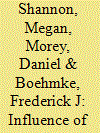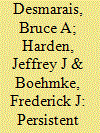| Srl | Item |
| 1 |
ID:
101621


|
|
|
|
|
| Publication |
2010.
|
| Summary/Abstract |
We argue that international organizations decrease the duration of international conflicts by mitigating commitment problems and encouraging combatants to cease hostilities more quickly. Empirical analyses of militarized interstate dispute duration (1950-2000) reveal that increasing shared international organization (IO) participation reduces the length of disputes, even after accounting for selection into international conflict. We also find that international organizations designed to mitigate commitment problems decrease dispute duration, while IOs capable of reducing information asymmetries do not influence dispute length.
|
|
|
|
|
|
|
|
|
|
|
|
|
|
|
|
| 2 |
ID:
140179


|
|
|
|
|
| Summary/Abstract |
The transmission of ideas, information, and resources forms the core of many issues studied in political science, including collective action, cooperation, and development. While these processes imply dynamic connections among political actors, researchers often cannot observe such interdependence. One example is public policy diffusion, which has long been a focus of multiple subfields. In the American state politics context, diffusion is commonly conceptualized as a dyadic process whereby states adopt policies (in part) because other states have adopted them. This implies a policy diffusion network connecting the states. Using a dataset of 187 policies, we introduce and apply an algorithm that infers this network from persistent diffusion patterns. The results contribute to knowledge on state policy diffusion in several respects. Additionally, in introducing network inference to political science, we provide scholars across the discipline with a general framework for empirically recovering the latent and dynamic interdependence among political actors.
|
|
|
|
|
|
|
|
|
|
|
|
|
|
|
|